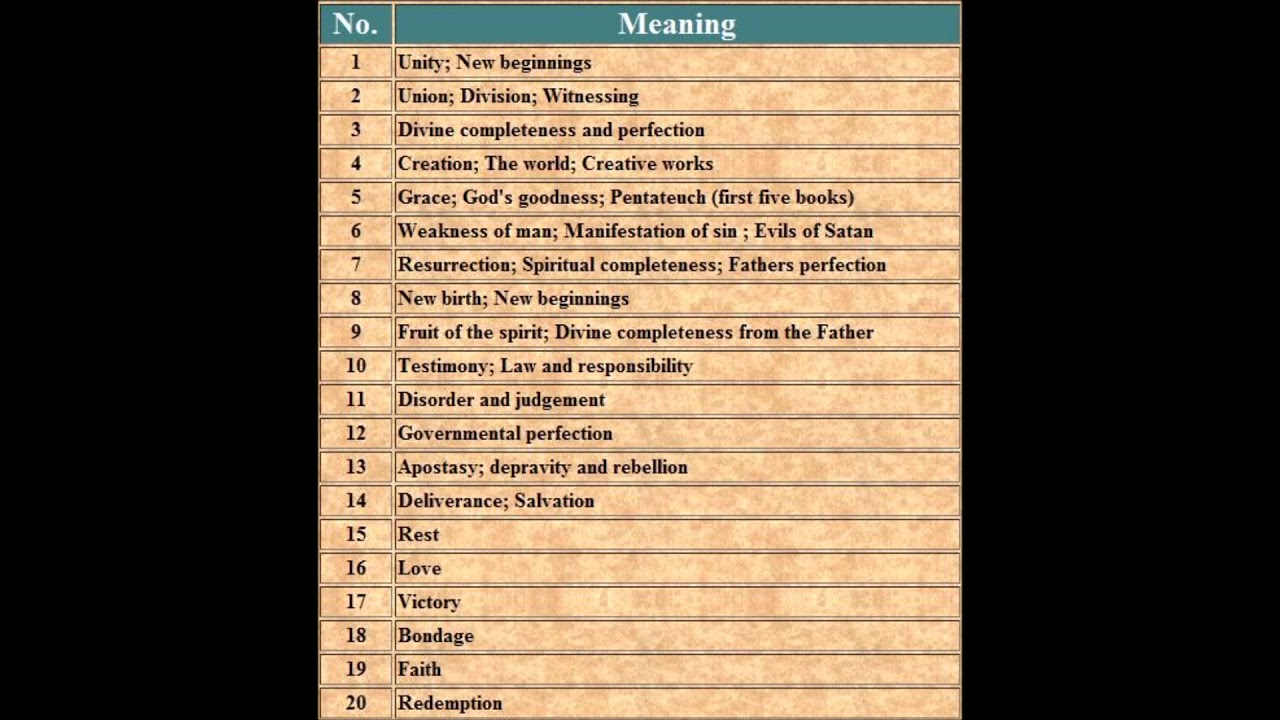Have you ever wondered what the significance of the number 1 is in the Bible? In this blog post, we will explore the spiritual meaning behind the number 1 in the Bible and how it can provide insights and guidance for our lives. Understanding the symbolism of numbers in the Bible can offer us a deeper understanding of God’s message and help us interpret His word more fully.
The number 1 holds a special place in the Bible, often symbolizing unity, new beginnings, and God’s singularity. By delving into the spiritual significance of the number 1, we can uncover hidden truths and find encouragement in knowing that God is the one true source of all things. Join us on this journey as we uncover the spiritual depth and symbolism of the number 1 in the Bible.
The Significance of the Number 1 in Biblical Spirituality
In the Bible, the number 1 holds significant spiritual symbolism and meaning. It often represents unity, new beginnings, and singular focus on God. One of the most prominent references to the number 1 in the Bible is found in the commandment to have no other gods before the one true God (Exodus 20:3). This emphasizes the importance of putting God first and acknowledging His supreme authority.
The concept of oneness is also seen in verses such as Deuteronomy 6:4, which states, “Hear, O Israel: The Lord our God, the Lord is one.” This underscores the monotheistic belief of Christianity and the idea of God’s indivisible nature.
Furthermore, the number 1 is associated with the idea of beginnings and creation. In the book of Genesis, God creates the heavens and the earth in six days, with each day culminating in a distinct aspect of creation. The first day is particularly significant as it represents the beginning of all things and sets the stage for God’s unfolding plan for the world.
Additionally, Jesus Christ is often referred to as the “firstborn” or the “firstfruits” in the New Testament, highlighting His preeminence and role as the ultimate example of faith and obedience. Colossians 1:18 describes Him as “the head of the body, the church; he is the beginning and the firstborn from among the dead, so that in everything he might have the supremacy.”
The number 1 also symbolizes uniqueness and singularity. Just as there is only one true God, believers are called to be set apart and distinct from the world. This notion is echoed in verses like Matthew 6:24, where Jesus declares, “No one can serve two masters. Either you will hate the one and love the other, or you will be devoted to the one and despise the other. You cannot serve both God and money.”
Overall, the number 1 carries profound spiritual significance in the Bible, representing unity, beginnings, oneness with God, and the call to prioritize Him above all else. It serves as a reminder of God’s sovereignty and our need to align our lives with His will and purpose.
What is the meaning of number 1 in the Bible?
In the Bible, the number 1 holds significant symbolism and meaning. It often represents unity, beginning, and God’s sovereignty. The concept of oneness is a central theme associated with number 1 in the Bible, emphasizing the sole authority and supremacy of God. Additionally, number 1 is linked to the idea of first or primary in various contexts, such as the first day of creation in Genesis 1:5 and the first commandment to worship one God in Exodus 20:3. Overall, number 1 in the Bible signifies uniqueness and divine power.
What does the number 1 mean in Hebrew?
In the context of the Bible, the number 1 in Hebrew is represented by the word “Echad.” This word signifies unity, uniqueness, and oneness. In the Hebrew Bible, one of the most famous verses related to this concept is found in Deuteronomy 6:4, which states, “Hear, O Israel: The LORD our God, the LORD is one.” This verse emphasizes the oneness of God in Jewish belief, highlighting the importance of monotheism.
What is God number in the Bible?
In the Bible, the concept of “God’s number” is not specifically mentioned. However, the number seven is often considered to be God’s number in the Bible. This is because the number seven is commonly associated with completeness and perfection in the Bible. For example, in the creation story, God rested on the seventh day after creating the world (Genesis 2:2-3), and there are also seven days in a week. Additionally, there are various instances throughout the Bible where the number seven is used to symbolize divine completion and perfection.
What does first represent in the Bible?
In the Bible, the word “first” can symbolize several important concepts. One significant meaning is the idea of priority or preeminence. For example, in Matthew 6:33, Jesus says, “Seek first his kingdom and his righteousness, and all these things will be given to you as well.” This verse emphasizes the importance of prioritizing God’s kingdom above all else.
Additionally, “first” can also represent beginning or genesis. In the opening words of the Bible in Genesis 1:1, it states, “In the beginning God created the heavens and the earth.” Here, “first” signifies the initial act of creation by God.
Furthermore, “first” can convey the idea of leadership or authority. In Colossians 1:18, it describes Jesus as being “the firstborn from the dead,” highlighting His supremacy and authority over all creation.
Overall, the concept of “first” in the Bible often carries themes of priority, beginning, and leadership, emphasizing the foundational and authoritative nature of certain figures or principles.

